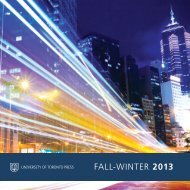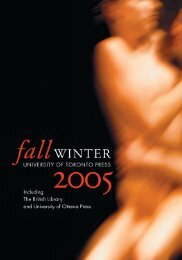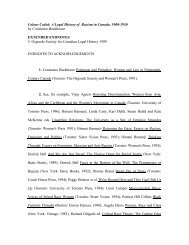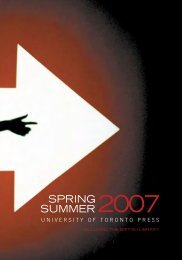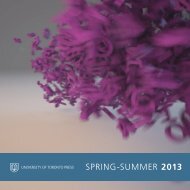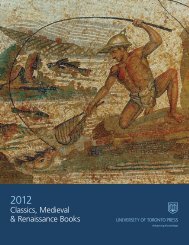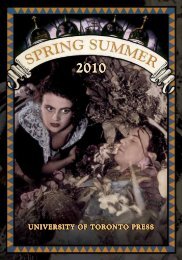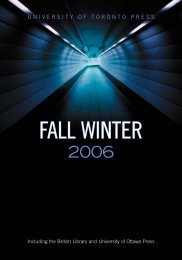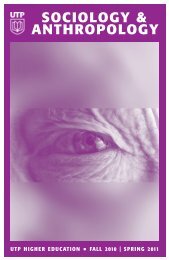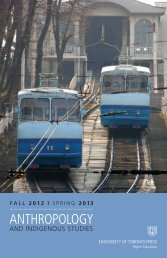Spring/Summer 2005 - University of Toronto Press Publishing
Spring/Summer 2005 - University of Toronto Press Publishing
Spring/Summer 2005 - University of Toronto Press Publishing
Create successful ePaper yourself
Turn your PDF publications into a flip-book with our unique Google optimized e-Paper software.
LITERARY STUDIESNarrative SettlementsGeographies <strong>of</strong> British Women’s Fictionbetween the WarsJennifer Poulos NesbittCaptivating SubjectsWriting Confinement, Citizenship, and Nationhood inthe Nineteenth CenturyEdited by Jason Haslam and Julia M. WrightDuring the interwar period, shifting attitudestoward empire dovetailed with women’s achievement<strong>of</strong> citizenship, placing women at the centre <strong>of</strong>debates about what England would be. Respondingto these cultural conditions, women writers usednovels <strong>of</strong> place to analyse relationships amongspace, self, and nation in England, thereby establishingnew ways for the country to view itself.Jennifer Poulos Nesbitt’s Narrative Settlementsresituates British women’s writing between the warsin light <strong>of</strong> postcolonial theories <strong>of</strong> the novel andfeminist geography. Reading works by WinifredHoltby, Vita Sackville-West, Angela Thirkell, SylviaTownsend Warner, Rebecca West, and VirginiaWoolf, Nesbitt argues that renewed attention to settingprovides a methodological base for a morenuanced understanding <strong>of</strong> the aesthetic preoccupations<strong>of</strong> women writers between the wars. She providesnot only attentive readings <strong>of</strong> literature duringthis contentious time, but a convincing argumentfor looking beyond modernism to locate the significance<strong>of</strong> interwar literary production.Jennifer Poulos Nesbitt is an assistant pr<strong>of</strong>essor inthe Department <strong>of</strong> English at Penn State York.Ever since Michel Foucault’s highly regarded work onprisons and confinement in the 1980s, critical examination<strong>of</strong> the forerunners to the prison – slavery, serfdom,and colonial confinements – has been rare.However, these institutions inform and participate inmany <strong>of</strong> the same ideologies that the prison enforces.Captivating Subjects is a collection <strong>of</strong> essays thatfills several crucial gaps in the critical analysis <strong>of</strong> therelations between Western state-sanctioned confinement,identity, nation, and literature. Editors JasonHaslam and Julia M. Wright have brought togetheran esteemed group <strong>of</strong> international scholars to explorenineteenth-century writings by prisoners, slaves, andother captives, tracing some <strong>of</strong> the continuitiesamong the varieties <strong>of</strong> captivity and their crucial relationshipto post-Enlightenment subjectivities.This volume is the first sustained examination<strong>of</strong> the ways in which the diverse kinds <strong>of</strong> confinementintersect with Western ideologies <strong>of</strong> subjectivity,investigating the modern nation-state’s relianceon captivity as a means <strong>of</strong> consolidating notions <strong>of</strong>individual and national sovereignty. It details thespecific historical and cultural practices <strong>of</strong> confinementand their relations to each other and to punishmentthrough a range <strong>of</strong> national contexts.Jason Haslam is a postdoctoral fellow in theDepartment <strong>of</strong> English at the <strong>University</strong> <strong>of</strong> NotreDame.Julia M. Wright is a Canada Research Chair inEnglish and Cultural Studies with the Department<strong>of</strong> English and Film Studies at Wilfrid Laurier<strong>University</strong>.Approx. 190 pp / 6 x 9 / May <strong>2005</strong>Cloth ISBN 0-8020-8986-0 £28.00 $45.00 EApprox. 290 pp / 6 x 9 / May <strong>2005</strong>Cloth ISBN 0-8020-8968-2 £32.00 $50.00 E21



